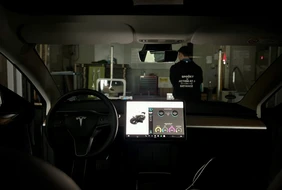What looks like a conventional Tesla at the e-charging station is a quantum leap for scientists at Ingolstadt Technical University. The company Quantum Optics Jena (QOJ) tested the exchange of quantum keys at THI. "We have already generated thousands of secret keys in a very short time," Dr. Kevin Füchsel, CEO of the company QOJ was pleased to say during the test. The Jena-based startup has been working for two years on solutions to revolutionize IT security through the use of quantum technologies and place it on the foundation of physical laws. In 2022, THI Vice President Prof. Dr. Hans-Joachim Hof became aware of the company's globally unique solution at a trade fair and established contact.
At the CARISSMA Institute C-ECOS, Institute of Electric, Connected and Secure Mobility, researchers are working on safe and sustainable solutions for future mobility. Optimal conditions for collaboration were therefore in place. In the first test, entangled light particles were exchanged between two receiver modules via a 50-kilometer fiber optic cable. One of these was integrated into the test vehicle. The cryptographic keys required, for example, to securely update software on a central server, are conveniently loaded into the vehicle when the battery is charged.
In this age of automated driving and the development of quantum computers, it is becoming increasingly important to build vehicles that cannot be hacked. "In our setup, the keys exist only between the two receiving parties and cannot be intercepted during transmission. This allows symmetric keys to be implemented for communication to the vehicle and ultimately used for a variety of scenarios," explains Füchsel. The team at the young company is convinced that this will significantly improve the IT security of vehicles. "Especially for highly automated driving and increasingly complex information systems, protection against hacker attacks and the use of new technologies is of immense importance," explains Prof. Hof.
Based on this success, a project application will now be submitted to the German Federal Ministry of Education and Research, says Marco Michl, research associate at the CARISSMA Institute C-ECOS. "The central question is: How can I practically install and apply this in a vehicle?" explains Michl. This is because, in addition to installing and qualifying the receiver modules in the vehicles, the infrastructure must also be expanded accordingly. The hurdles for networks that are supposed to be highly secure - such as government and healthcare networks - are high. "The THI is taking its first steps here with regard to quantum key exchange and quantum-safe encryption", says Michl.


![[Translate to English:] Logo Akkreditierungsrat: Systemakkreditiert](/fileadmin/_processed_/2/8/csm_AR-Siegel_Systemakkreditierung_bc4ea3377d.webp)








![[Translate to English:] Logo IHK Ausbildungsbetrieb 2023](/fileadmin/_processed_/6/0/csm_IHK_Ausbildungsbetrieb_digital_2023_6850f47537.webp)


